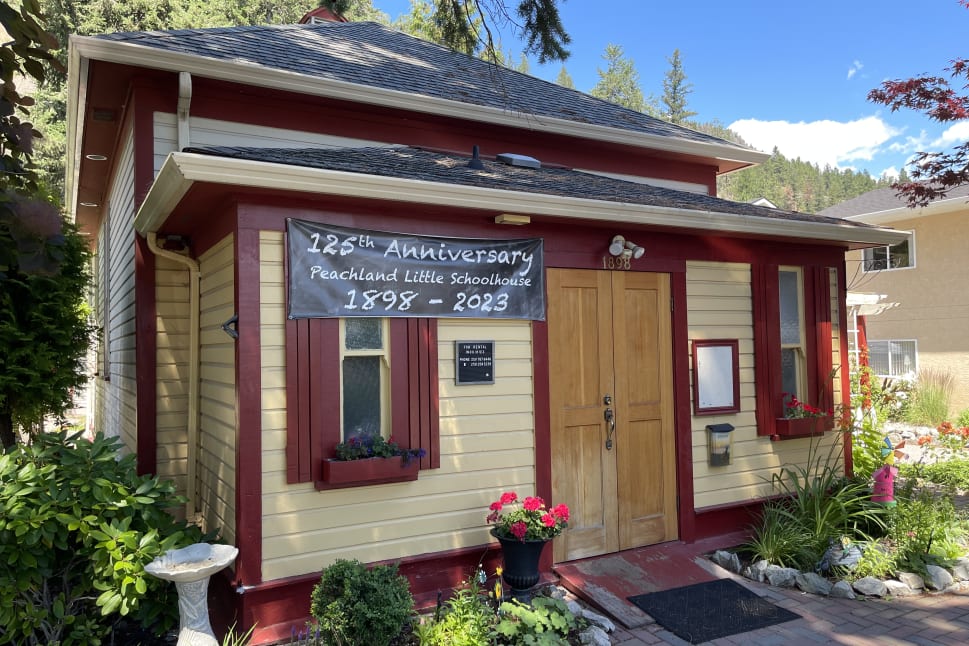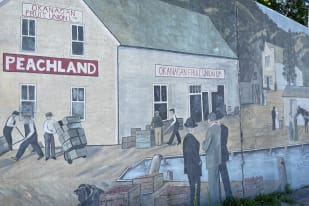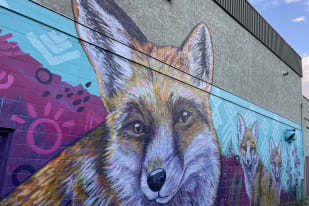Rich in history and culture, Peachland boasts numerous historic sites that tell the story of its past. From its early beginnings, this community has been a hub of innovation and natural beauty, with each historic site offering a unique window into the life and times of its residents.
Little School House
The Little School House, erected in 1898, quickly became too small for the growing student population, leading to the construction of a new school in 1908. The building was later used by St. Margaret's Anglican Church until 1990 and now hosts art shows and workshops.
Historic School House
Built in 1908, the Historic School House closed in 2002 and has served as the Peachland Visitor Centre, Art Gallery, and Boys & Girls Club. Since 2024, it is now home to the Art Gallery under the Peachland Community Arts Council (PCAC), Okanagan Folk School Society (OKFS), and Bat Education and Ecological Protection Society (BEEPS). An interesting fact about this building is its attic, which houses one of BC's largest maternal bat colonies.
Peachland Baptist Church and Museum
Constructed mainly by volunteers in 1910, the unique 8-sided Peachland Baptist Church served as a place of worship until 1964. Over the years, it has functioned as a temporary Municipal Hall, Parks and Recreation Office, Fire Brigade Hall, and Public Library. Since 1980, the building has housed the Peachland Museum and was declared an official British Columbia Heritage site in 1981. It will now also house the Visitor Centre.
The museum displays hundreds of historical artifacts, photographs, newspapers, and documents that offer a glimpse into the rich history of Peachland and its people. The upper floor of the Museum houses a scale model of the Kettle Valley Railway, as it existed between 1955 and 1965, built and maintained by the Central Okanagan Railway Company.
The Methodist Church
Built in 1911, the Methodist Church was notable for its bell tower, with a bell donated by the T.E. Eaton company that has rung every Sunday since it became a United Church in 1925. Today, it houses "The Bargain Bin," a popular non-profit second-hand store.
Walters Packing House
Originally situated in Heritage Park, Walters Limited Packing House played a crucial role in Peachland's agricultural sector. Local orchards would send their fruit here to be loaded onto rail barges, connecting to the railway in Kelowna for transportation across Canada. Although the original packing house was lost to a fire in 1979, the park now features a gazebo and a fully accessible lakefront pier, serving as a venue for civic events, thanks to the collaborative efforts of local community groups.
Lakeside Auto & Gas
Constructed in 1946, Lakeside Auto & Gas stands as a demonstration to Peachland's mid-20th-century architecture and commerce. As one of the three gas stations on Beach Ave, which was the main highway at the time, it is noted for its unique art deco design. Following the construction of the present highway in 1961, the building transitioned into a popular dining spot, preserving its historic charm.
Cenotaph
Peachland's cenotaph bears a somber reminder of the sacrifices made by its residents in the World Wars. With a staggering number of casualties, particularly from WWI, Peachland had one of the highest per capita losses in Canada. Originally erected in 1921, the cenotaph was relocated in 1976 to honour those who served.
J.M. Robertson Home
The Edgewater Inn which stands today was originally J.M. Robertson's home built in 1898. It has undergone numerous transformations from a hotel to a post office and then a store. Today, it serves as a pub and venue for live music, continuing to be a central part of Peachland's social life.
Clements Store & Gas
Around 1908, James H. Clements established a store and Imperial Oil Gas Station, becoming a hub for the community with Mary Clements baking hundreds of loaves of bread weekly. Over the years, the location has hosted various restaurants, maintaining its place in Peachland's commercial landscape.
Conclusion
Peachland's historic sites not only offer a glimpse into the town's past but also serve as active parts of the community, blending history with modern-day uses. From gas stations turned restaurants to schools transformed into art galleries, Peachland beautifully maintains its heritage while evolving to meet contemporary needs





